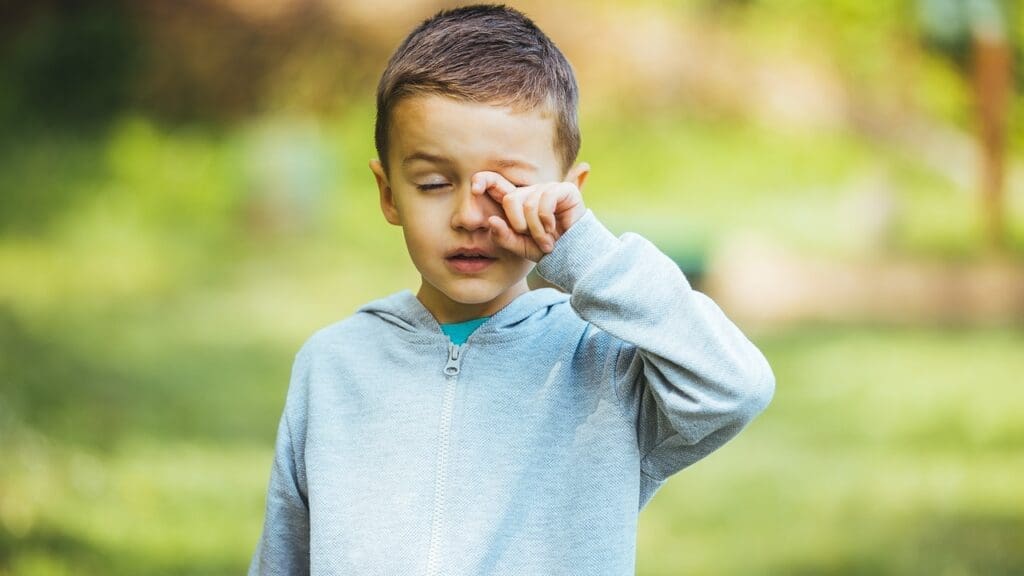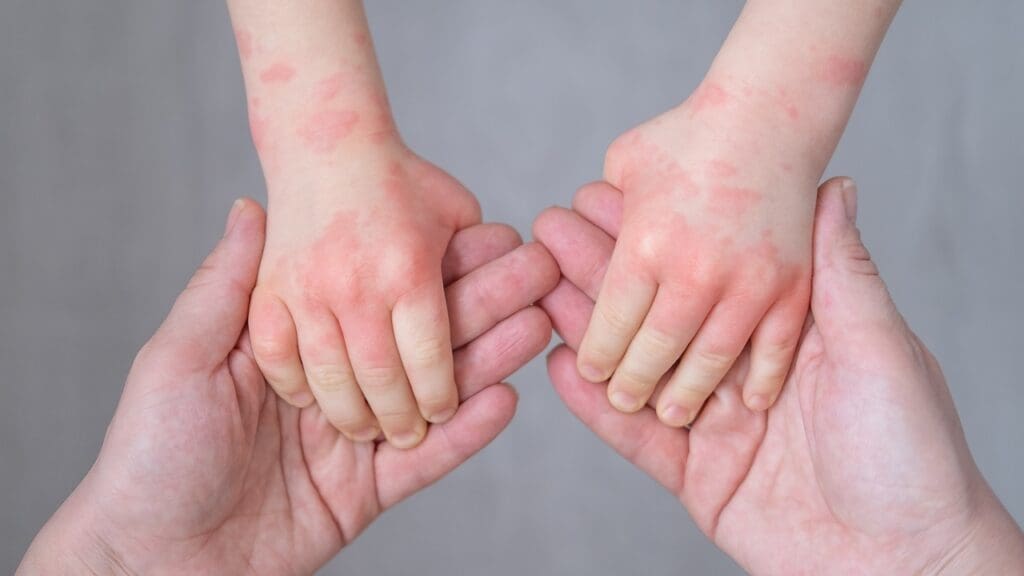Why Spring Allergy in Children Happens and How to Prevent It
Spring brings warmth, sunshine, and the beauty of blooming trees, but for many families, it also marks the return of seasonal allergies. Spring allergy in children is one of the most common seasonal health issues, causing sneezing, watery eyes, and fatigue just when kids should be enjoying outdoor play. The main reason is that their immune systems react strongly to airborne pollen and other allergens present during this season.
When a child’s body mistakes pollen for a harmful substance, it releases histamines that trigger allergic symptoms. The reaction is not dangerous but can significantly affect comfort, focus, and sleep. Liv Hospital’s pediatric allergy specialists help families identify triggers early, provide accurate diagnosis, and offer personalized treatment plans to ensure that every child breathes easily and stays healthy throughout the spring months.

Understanding Seasonal Allergies
Seasonal allergies occur when the immune system reacts to substances that are harmless for most people. During spring, the air is filled with pollen from trees, grasses, and flowers. These tiny particles travel long distances and are easily inhaled by children.
The immune system of a sensitive child releases antibodies to fight these allergens, resulting in inflammation of the eyes, nose, and throat. This inflammation leads to symptoms such as congestion, sneezing, and itching. Because children spend much of their time outdoors, they are naturally more exposed to pollen, especially in playgrounds and gardens.
Outdoor Exposure and Seasonal Triggers
As spring begins, children spend more time outdoors, enjoying playgrounds, parks, and nature walks. However, this increased exposure also raises their contact with pollen and other airborne irritants. Spring allergy in children often becomes noticeable during this period, as their immune systems react to these seasonal particles. When pollen levels peak, sensitive children may experience discomfort that disrupts their usual activities. Even light outdoor play can trigger sneezing, itchy eyes, and nasal congestion, especially on windy days.
Recognizing Allergy Symptoms
Many parents mistake allergy symptoms for a common cold, yet there are important differences. Seasonal allergies cause clear nasal discharge, persistent itching, and watery eyes without fever. These symptoms often appear at the same time every year and improve indoors or after rainfall when pollen levels drop. Understanding these distinctions helps families respond promptly and prevent unnecessary treatments.
Importance of Early Diagnosis and Prevention
Liv Hospital’s pediatric allergy specialists highlight that early diagnosis is key to managing spring allergy in children. Identifying the exact allergens through tests enables personalized care and better control over symptoms. Children with asthma or eczema may require extra follow-up to avoid complications. With professional medical guidance, a healthy diet, and lifestyle adjustments, most children can enjoy the season comfortably and safely.
Why Some Children Are More Affected
Not all children develop allergies, even if exposed to the same environment. Genetics play a significant role. If one or both parents have allergies, the risk for the child increases. Environmental factors such as pollution, humidity, and air quality also influence allergic sensitivity.
Another reason some children are more prone to seasonal reactions is the immaturity of their immune system. Their bodies are still learning to distinguish harmful agents from harmless ones. At Liv Hospital, pediatric specialists use safe diagnostic tests to evaluate these sensitivities and design prevention programs that fit each child’s unique needs.
Common Symptoms to Watch For
Parents can usually identify the signs of seasonal allergy by observing changes in behavior and comfort. The most frequent symptoms include:
- Frequent sneezing
- Itchy or red eyes
- Clear runny nose or nasal congestion
- Sore or itchy throat
- Fatigue and irritability
- Coughing, especially at night
These symptoms often resemble a mild cold, but the difference is that allergic symptoms return each year around the same season and do not include fever. Persistent or worsening symptoms may indicate the need for professional evaluation.

The Role of Pollen and Environmental Triggers
Pollen is the leading cause of seasonal allergies in spring. As plants bloom, they release microscopic grains into the air. Wind and temperature changes can spread them widely. Children who play outside during mid-morning or early evening are especially vulnerable because pollen counts are higher during those hours.
Other contributing factors include mold spores, dust mites, and air pollution. Even indoor spaces can harbor allergens, especially when windows are left open or carpets accumulate dust. Liv Hospital advises families to track daily pollen levels and adjust outdoor activities accordingly to prevent flare-ups.
Diagnosing Allergies in Children
Proper diagnosis is essential to determine what exactly is causing the symptoms. Pediatric allergists perform detailed assessments to rule out other conditions and pinpoint the specific allergens.
Two standard tests are often used:
- Skin prick test – A small drop of allergen extract is placed on the skin to observe any local reaction.
- Blood test – Measures the presence of allergy-related antibodies called IgE.
These simple, safe tests help doctors recommend targeted treatment rather than relying on broad or unnecessary medications. Liv Hospital’s allergy clinics use advanced diagnostic equipment to ensure comfort and accuracy throughout the process.
Effective Treatment Options
The main goal of treatment is to relieve symptoms and prevent flare-ups. Pediatric allergy care typically includes a combination of medication, lifestyle changes, and preventive strategies.
Antihistamines
These reduce sneezing and itching by blocking histamine, the chemical responsible for allergic reactions.
Nasal Sprays
Steroid or saline sprays ease inflammation and congestion in the nasal passages.
Eye Drops
Lubricating or antihistamine drops relieve irritation and redness.
Immunotherapy
For children with persistent symptoms, allergen immunotherapy gradually desensitizes the immune system through small doses of allergens, either by injections or drops.
Liv Hospital’s pediatric allergy team tailors treatment based on the child’s symptoms, age, and overall health, ensuring minimal side effects and long-term relief.
Lifestyle and Home Management
Simple daily habits can make a significant difference in controlling allergy symptoms. Parents can follow these recommendations:
- Keep windows closed during high pollen hours.
- Use air conditioners with clean filters.
- Encourage daily showers and hair washing after outdoor play.
- Change clothes when coming indoors.
- Vacuum regularly using HEPA-filtered cleaners.
- Avoid outdoor activities when pollen counts are at their highest.
Creating an allergen-free environment helps children rest better and reduces dependency on medication. Liv Hospital’s allergy care programs include family education sessions that guide parents in establishing these protective routines.
Nutrition and Immune Support
While no food can directly cure allergies, a healthy diet strengthens the immune system and reduces inflammation. Fresh fruits and vegetables rich in vitamins A, C, and E help protect the respiratory system. Foods high in omega-3 fatty acids, such as salmon and walnuts, may also help lower allergic responses.
Ensuring proper hydration supports mucous membranes, while limiting processed foods and sugary drinks can reduce inflammation. Liv Hospital’s nutrition specialists design balanced meal plans for children with allergies to ensure strong immunity and overall growth.
When to Visit a Specialist
If symptoms persist for more than two weeks, interfere with sleep, or worsen during outdoor activities, it is time to seek professional help. Early medical attention prevents chronic sinus issues or asthma from developing.
Pediatric allergists can determine whether the symptoms are seasonal or year-round and provide treatments that work quickly. Liv Hospital offers integrated allergy and respiratory care so that children receive complete support under one roof.
Living Happily During Spring
Children can still enjoy the beauty of spring with proper precautions. Medication, clean environments, and awareness make it possible to balance outdoor play and comfort. Parents should encourage their children to wear sunglasses outdoors, maintain good hygiene, and take prescribed medication consistently.
Liv Hospital focuses on preventive care rather than simply treating symptoms. This approach allows children to remain active, confident, and healthy during the entire season.
Conclusion
Seasonal allergies are a common challenge for children, but they are manageable with the right combination of care, prevention, and education. Understanding the triggers, recognizing early symptoms, and following medical advice help minimize the effects of allergens in daily life.
Liv Hospital’s pediatric specialists combine advanced technology and compassionate care to guide families through diagnosis, treatment, and long-term management. With expert support, children can enjoy spring’s warmth and colors while staying comfortable and symptom-free.
* Liv Hospital Editorial Board has contributed to the publication of this content .
* Contents of this page is for informational purposes only. Please consult your doctor for diagnosis and treatment. The content of this page does not include information on medicinal health care at Liv Hospital .
For more information about our academic and training initiatives, visit Liv Hospital Academy
Frequently Asked Questions
What causes spring allergies in kids?
They occur when the immune system reacts to pollen, mold, or dust during the spring season.
At what age can children develop allergies?
Allergies can appear at any age, but they are most common in early school years.
How long do spring allergies last?
Symptoms usually persist through the pollen season, typically lasting several weeks.
Is there a cure for allergies?
There is no permanent cure, but treatments and preventive care effectively control symptoms.
How can I tell if it is an allergy or a cold?
Allergies cause clear mucus, itching, and repeat yearly, while colds include fever and body aches.
Can allergies affect school performance?
Yes, poor sleep and nasal congestion can reduce concentration and energy levels.
What is the safest treatment for children?
Antihistamines and nasal sprays prescribed by a pediatric allergist are safe and effective.
Do allergies increase the risk of asthma?
Yes, untreated allergies can irritate the airways and trigger asthma symptoms.
Can pets make allergies worse?
Yes, pet dander and fur can combine with pollen, intensifying allergic reactions.
Where can parents find expert allergy care?
Liv Hospital provides specialized pediatric allergy services with personalized treatment and long-term management.